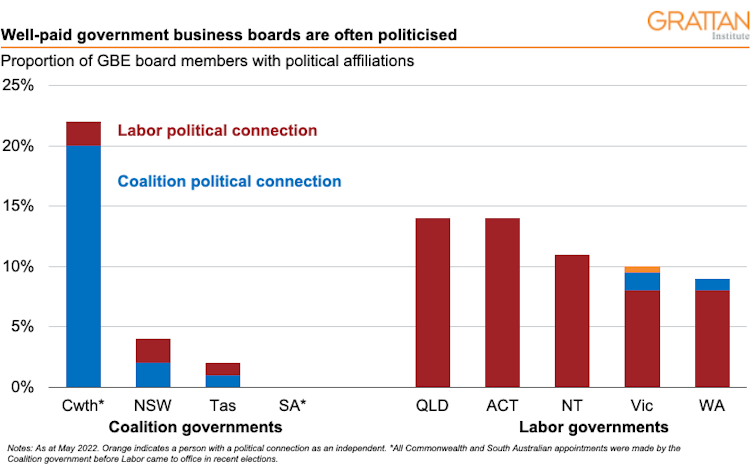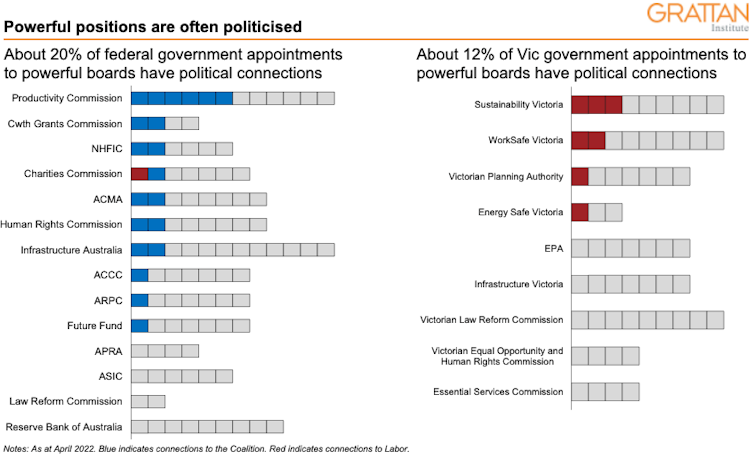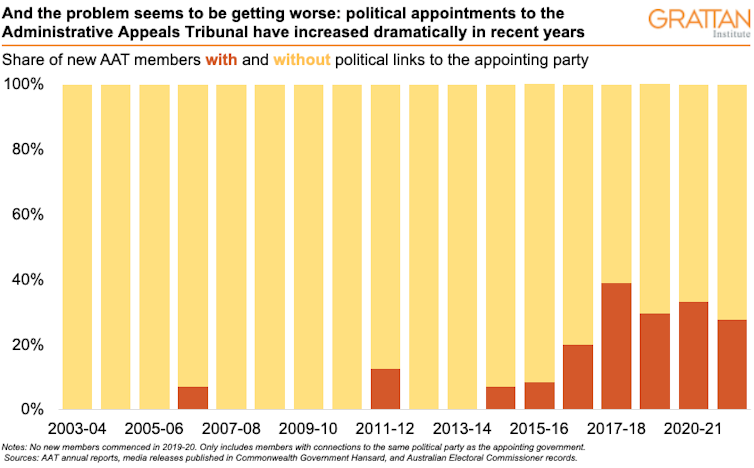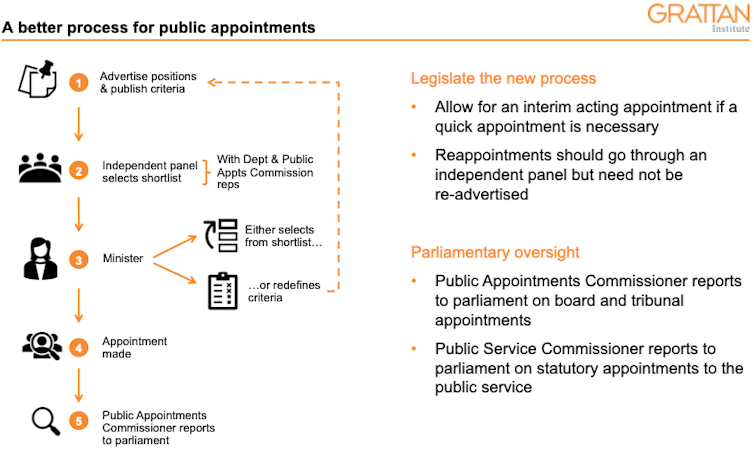Kate Griffiths, Anika Stobart and Danielle Wood, Grattan Institute.
Handing out a cushy job to a political mate might seem harmless – after all, everyone does it, right? – but the politicisation of public appointments has real, pervasive consequences for Australian democracy. Increasingly, many government boards, tribunals and independent agencies are stacked with people who have worked in politics.
A new Grattan Institute report, released today, shows that political appointments are common at state and federal levels. It reveals the costs all Australians bear when governments choose mates over merit.
Political appointments are widespread
About 7% of federal government–appointed jobs in public bodies are filled by people who have worked as a politician, political adviser, candidate or party employee.
But this is just the baseline. Political appointments triple to 21% for jobs on well-paid, powerful and/or prestigious boards. That’s one in five of these top public roles. Individually, many of those people may have the right qualifications, but collectively their presence undermines these important positions.
On the boards of Australia Post and other federal government businesses – companies employing thousands of people and managing income in the billions – more than 20% of members have a political connection. In most states, the figure is above 10%. This is in stark contrast to ASX100 boards with very similar responsibilities, where fewer than 2% of board members have a direct political connection.

The boards of powerful independent government bodies, including regulators and commissions, are also filled with political appointments. Half of the members of the Productivity Commission board, for example, have a connection to the Coalition.
While skills established in a political career might be valuable, most political appointees are from the same side of politics as the government that appointed them. The signs are that mateship is prevailing over merit.

Political stacking is especially evident on the Administrative Appeals Tribunal (AAT), an independent expert body that reviews government decisions on everything from child support to migration status.
The AAT has become an attractive destination for political appointments, offering the full trifecta of powerful, prestigious and well-paid (AAT member salaries range from nearly $200,000 to nearly $500,000). A staggering 20% of the AAT’s 320 tribunal members have a direct political connection to the government that appointed them.
And the problem seems to be getting worse. Political appointments to the AAT have grown substantially in the past five years. Many of these appointments were made in the lead-up to the 2019 and 2022 federal elections.

Political appointments damage institutions and trust
Public appointments shouldn’t be regarded as “nice things to give to mates”. People in these roles make important decisions that should be kept at arm’s length from government. In some cases, political appointees have significant influence over public policy.
Politicising public appointments can compromise government regulation and oversight, promote a corrupt culture and undermine public trust in the institutions of government.
“Captain’s picks” don’t always have the skills and experience needed to carry out their responsibilities effectively. A Grattan Institute analysis of performance data shows AAT members with political affiliations perform worse on average than those without. Almost a quarter (24%) of political appointees fall well short of their performance targets, compared to 17% of non-political appointees.
Even if the person appointed is fully capable of doing the job, their presence can compromise the perceived or actual independence of the institution. These appointments promote a culture of patronage in which loyalty is assumed to be more important than merit. A culture of this kind can have a chilling effect on non-political candidates and appointees too – they may fear that rocking the boat or providing frank and fearless advice will be career-limiting.
A better way
If Australia had a better process for making public appointments, we could be confident appointees were there on merit, whether they are politically affiliated or not.
This problem has an easy fix. Federal and state governments should establish a transparent, merit-based process for all public appointments. As the chart below shows, the new process should be legislated and overseen by a dedicated public appointments commissioner. The commissioner’s work would restore public confidence in appointees and lift the performance of public sector boards and tribunals.

This process could help change the culture: seeking the best person for the job would become the only consideration ministers bring to bear on their decisions. If the new federal government is serious about doing politics differently, this is an easy change that would make a real difference.
Kate Griffiths, Deputy Program Director, Grattan Institute; Anika Stobart, Associate, Grattan Institute, and Danielle Wood, Chief executive officer, Grattan Institute
This article is republished from The Conversation under a Creative Commons license. Read the original article.

